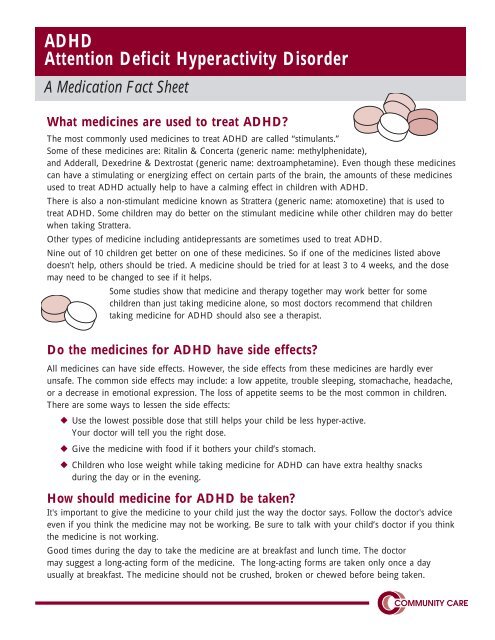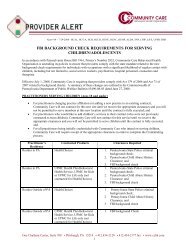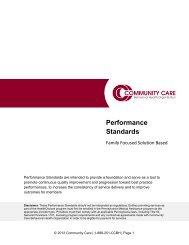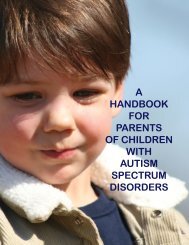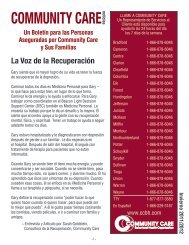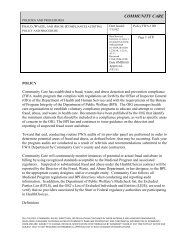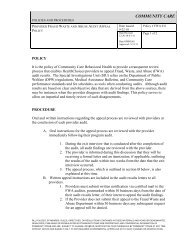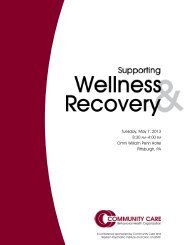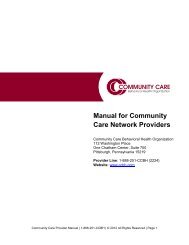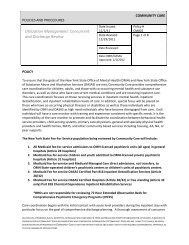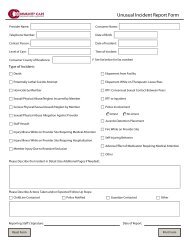ADHD Attention Deficit Hyperactivity Disorder A Medication Fact ...
ADHD Attention Deficit Hyperactivity Disorder A Medication Fact ...
ADHD Attention Deficit Hyperactivity Disorder A Medication Fact ...
Create successful ePaper yourself
Turn your PDF publications into a flip-book with our unique Google optimized e-Paper software.
<strong>ADHD</strong><br />
<strong>Attention</strong> <strong>Deficit</strong> <strong>Hyperactivity</strong> <strong>Disorder</strong><br />
A <strong>Medication</strong> <strong>Fact</strong> Sheet<br />
What medicines are used to treat <strong>ADHD</strong>?<br />
The most commonly used medicines to treat <strong>ADHD</strong> are called “stimulants.”<br />
Some of these medicines are: Ritalin & Concerta (generic name: methylphenidate),<br />
and Adderall, Dexedrine & Dextrostat (generic name: dextroamphetamine). Even though these medicines<br />
can have a stimulating or energizing effect on certain parts of the brain, the amounts of these medicines<br />
used to treat <strong>ADHD</strong> actually help to have a calming effect in children with <strong>ADHD</strong>.<br />
There is also a non-stimulant medicine known as Strattera (generic name: atomoxetine) that is used to<br />
treat <strong>ADHD</strong>. Some children may do better on the stimulant medicine while other children may do better<br />
when taking Strattera.<br />
Other types of medicine including antidepressants are sometimes used to treat <strong>ADHD</strong>.<br />
Nine out of 10 children get better on one of these medicines. So if one of the medicines listed above<br />
doesn't help, others should be tried. A medicine should be tried for at least 3 to 4 weeks, and the dose<br />
may need to be changed to see if it helps.<br />
Some studies show that medicine and therapy together may work better for some<br />
children than just taking medicine alone, so most doctors recommend that children<br />
taking medicine for <strong>ADHD</strong> should also see a therapist.<br />
Do the medicines for <strong>ADHD</strong> have side effects?<br />
All medicines can have side effects. However, the side effects from these medicines are hardly ever<br />
unsafe. The common side effects may include: a low appetite, trouble sleeping, stomachache, headache,<br />
or a decrease in emotional expression. The loss of appetite seems to be the most common in children.<br />
There are some ways to lessen the side effects:<br />
◆ Use the lowest possible dose that still helps your child be less hyper-active.<br />
Your doctor will tell you the right dose.<br />
◆ Give the medicine with food if it bothers your child’s stomach.<br />
◆ Children who lose weight while taking medicine for <strong>ADHD</strong> can have extra healthy snacks<br />
during the day or in the evening.<br />
How should medicine for <strong>ADHD</strong> be taken?<br />
It's important to give the medicine to your child just the way the doctor says. Follow the doctor's advice<br />
even if you think the medicine may not be working. Be sure to talk with your child’s doctor if you think<br />
the medicine is not working.<br />
Good times during the day to take the medicine are at breakfast and lunch time. The doctor<br />
may suggest a long-acting form of the medicine. The long-acting forms are taken only once a day<br />
usually at breakfast. The medicine should not be crushed, broken or chewed before being taken.
<strong>ADHD</strong> <strong>Attention</strong> <strong>Deficit</strong> <strong>Hyperactivity</strong> <strong>Disorder</strong><br />
A <strong>Medication</strong> <strong>Fact</strong> Sheet continued<br />
Myths About Stimulant <strong>Medication</strong><br />
■ MYTH:<br />
■ FACT:<br />
■ MYTH:<br />
■ FACT:<br />
■ MYTH:<br />
■ FACT:<br />
Stimulants can lead to drug addiction when the child gets older.<br />
Stimulants help many children focus and do better at school, home, and play. Not having<br />
bad experiences in these areas while a child is young may actually help them from having<br />
addictions and other emotional problems when they are older.<br />
Doing better while taking a stimulant medicine proves a child has <strong>ADHD</strong>.<br />
Stimulants may help many children to focus and pay better attention, even if they do not<br />
have <strong>ADHD</strong>. The change may just be easier to see in children who do have <strong>ADHD</strong>.<br />
<strong>Medication</strong> should be stopped when the child becomes a teenager.<br />
Not so! About 8 out of 10 of children who needed medicine as a child still need it when<br />
they are older. Five out of 10 will need the medicine as an adult.<br />
How long will this treatment last?<br />
The length of time a child takes the medicine depends on each child. Everyone is different. Some children<br />
only need a short treatment period maybe for 1 to 2 years. For some children, treatment may last<br />
until they are a teenager, or even as an adult.<br />
It is normal for parents to be worried about whether taking medicine is the best thing for their child.<br />
Parents need to understand the benefits and risks of taking medicine. Your child’s doctor can give you<br />
advice and answer all the questions you may have about medicines used<br />
to treat <strong>ADHD</strong>.<br />
◆ ◆ ◆ ◆ ◆ ◆ ◆<br />
This handout provides a general overview of this topic.<br />
It may not apply to everyone.<br />
To find out if this handout applies to you, and<br />
to get more information on this subject<br />
it is important to talk to you doctor.<br />
◆ ◆ ◆ ◆ ◆ ◆ ◆<br />
This fact sheet is part of the <strong>ADHD</strong><br />
Preventive Health Program which sends a<br />
series of free educational newsletters about<br />
<strong>ADHD</strong> to parents/guardians of children ages<br />
12 year and under. If you are not already<br />
enrolled in the Preventive Health Program<br />
and would like to receive the newsletters,<br />
please call the toll-free Preventive Health<br />
Phone Line at 1-866-639-2943.<br />
<strong>ADHD</strong> Medicines. American Academy of Family Physicians 2000-2002.<br />
http://www.familydoctor.org.htm<br />
Kutscher, M. MD, Wolff, R. MD (2002). The <strong>ADHD</strong> e-book: Living as if there is no tomorrow.<br />
Pediatric Neurological Associates, White Plains, NY.<br />
http://www.pediatricneurology.com/adhd.htm<br />
<strong>Attention</strong> <strong>Deficit</strong> <strong>Hyperactivity</strong> <strong>Disorder</strong>. Mayo Foundation for Medical Education and Research. 1998-2003.<br />
http://www.mayoclinic.com/Medical<br />
<strong>Attention</strong> <strong>Deficit</strong> <strong>Hyperactivity</strong> <strong>Disorder</strong>. National Institute of Mental Health. NIH Publication No. 96-3572, 1994.<br />
http://www.nimh.nih.gov/publicat/adhd.cfm


